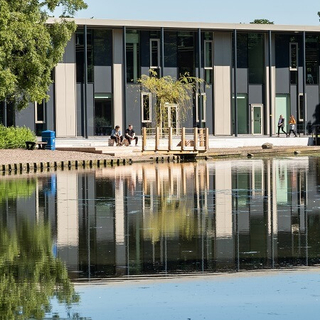MSc Commercial Management and Quantity Surveying
Skip to section
Key information
- Location
- Edinburgh
- Mode of delivery
- On-campus
- Delivery type
- Full-time, Part-time
- Start date
- September
- Duration
- 1 year
- Qualification
- MSc
Contact
Contact our enquiries team
Contact usOverview
Ranked 2nd (The Times / The Sunday Times Good University Guide 2023) and 7th (Complete University Guide 2023) in the UK for Building.
Our Commercial Management and Quantity Surveying course is designed to meet the needs of the financial management and quantity surveying sectors. The degree offers a solid theoretical base, combined with a strong focus on industrial relevance. This means that you'll quickly be able to make a positive contribution to the success of your working environment, and the development of your own professional careers. Our students are often recruited by international construction and quantity surveying practices. Graduates also develop careers across different sectors of industry and commerce. Ranked 2nd (The Times / The Sunday Times Good University Guide 2023) and 7th (Complete University Guide 2023) in the UK for Building. See our rankings for more information.
This course is delivered by the Centre of Excellence in Sustainable Building Design, a leading body recognised by the Royal Academy of Engineering. This is one of four such centres established at UK universities that jointly form a national network to demonstrate and exchange best practice in teaching and research for the sustainable built environment.
September 2024 entry
The deadline for applications from UK students is 30 August 2024. For EU and overseas applicants, we guarantee to consider applications submitted by 2 August 2024.
Flexible study options
This course can be studied full-time, part-time on campus. It can also be studied via Online Learning, ideal for those in employment or with other commitments, providing flexible study options that fit around work or family.
Programme duration
- Full-time: 1 year
- Part-time: 2 years
Video
Heriot-Watt graduate Colleen McGhee talks about why she chose the MSc Commercial Management and Quantity Surveying.
Course content
Year 1
MSc students take eight taught courses plus a research dissertation or integrated project . Students on the Postgraduate Diploma programme take the 8 taught courses only.
Students study seven mandatory courses and choose one optional course.
Semester 1
Core courses
- Advanced Construction Technology
- Strategic Commercial and Contract Management
- Value and Risk Management
Optional courses
- Sustainability for Construction Professionals
- Environmental Geotechnics
- Quantity Surveying Practice
- Urban Economy and Property Markets
- Real Estate Appraisal and Finance
Semester 2
Core courses
- Construction Practice and Information Technology
- Quantity Surveying Financial Management
- Construction Financial Management
- People and Organisation Management in the Built Environment
Semester 3
- Research Dissertation (CPMQS)
- Integrated Project
Go Global
Some of our Postgraduate Taught Masters Programmes are eligible for Inter-Campus Transfer. Please contact studywithus@hw.ac.uk for further information.
Fees and funding
Tuition fees
| Status [footnote 1] | Full-time | Part-time |
|---|---|---|
| UK | 9152 | 4576 |
| Overseas [footnote 2] | 19056 | 9528 |
Scholarship for Academic Excellence
Our Postgraduate Scholarship for Academic Excellence in MSc Commercial Management and Quantity Surveying offers a £1,000 tuition fee reduction.
Scholarships and bursaries
We aim to encourage well-qualified, ambitious students to study with us and we offer a wide variety of scholarships and bursaries to achieve this. Over £6 million worth of opportunities are available in fee and stipend scholarships, and more than 400 students benefit from this support.
View our full range of postgraduate scholarships.
Entry requirements
Entry
Masters (MSc) level entry applicants must have one of the following:
- Minimum of 2:1 honours degree or equivalent academic qualification in a cognate or semi-cognate subject area
- Minimum of 2:1 honours degree or equivalent academic qualification in a non-cognate subject area but demonstrates an interest in the discipline (supported by a personal statement, detail of work experience)
- Corporate (or chartered) membership of relevant professional institutions will also be considered
PG Diploma level entry applicants must have an ordinary degree in a related subject area and relevant post qualification industry experience.
Candidates who do not meet the above entry requirements or have no formal academic qualifications will be considered individually based on their CV and possibly interview. Admission via this route will be at the discretion of the Director of Recruitment.
Recognition of Prior Learning
We are committed to providing study opportunities to applicants who have a wide range of prior experiences through Recognition of Prior Learning (RPL). For more information on RPL, please contact the Admissions Team (studywithus@hw.ac.uk) ahead of application. We can only consider requests for RPL at the time of application to a course of study.
English language requirements
If English is not the applicant's first language a minimum of IELTS 6.5 or equivalent is required with all elements passed at 6.0 or above. Please refer to English language requirements for further details.
Some applicants may be asked for alternative evidence in line with UKVI recognised English speaking countries. Applicants who have previously successfully completed courses delivered in the medium of English language may be considered and will be required to provide documentary evidence of this. Examples would be secondary school education or undergraduate degree. A minimum of at least one year of full time study (or equivalent) in the medium of English language will be required.
All evidence of English language needs to be dated within two years of the commencement of study.
We also offer a range of English language courses to help you meet the English language requirement prior to starting your master's programme:
- 20 weeks English (for IELTS of 5.0 with no skill lower than 4.5)
- 14 weeks English (for IELTS of 5.0 with minimum of 5.0 in writing and no skill lower than 4.5)
- 10 weeks English (for IELTS of 5.5 with no skill lower than 5.0)
- 6 weeks English (for IELTS 5.5 with no skill lower than 5.5)
Why Heriot-Watt?
Ranking (Building, Complete University Guide 2023)
We are ranked 1st in Scotland and 7th in the UK for Building in the Complete University Guide 2023.
Online events
We host online events throughout the year, giving you the opportunity to speak to our academic teaching staff, meet students, find out what it is like to study using our Virtual Learning Environment (VLE) and discover how to enrol.
Lifelong connections
Upon completing your studies you will automatically join the UK's oldest alumni association The Watt Club, with 147k members worldwide.
Flexibility and affordability
Study at a time and pace that suits you, and even while you work. HW Online offers pay-as-you-study courses and fees inclusive of exams and study materials, meaning you can focus on success, not extra costs.
Constructionarium
Students can participate in Constructionarium, which provides hands-on construction working alongside professional engineers and tradesmen to construct scaled down versions of bridges, buildings, dams and civil engineering projects.
Clubs and activities
At Heriot-Watt we have an extensive programme of over 90 sports clubs and societies to get involved in. You can try as many as you like or start one of your own!
Edinburgh campus accommodation
Living on our beautiful Edinburgh campus is a great way to meet others from all over the world. Our student accommodation is within easy reach of the teaching buildings, sports facilities, catering venues and the Student Union
Edinburgh Campus facilities
At Heriot-Watt University, we offer a wide range of services to help you deal with all aspects of your life with us, whether these be academic, personal, technical, financial or just plain fun!
Health and wellbeing
Student Wellbeing Services aim to provide a range of support, guidance, activities and advice to help students to be their best, and get the most from their university experience. From counselling to coaching we'll sure you are fully supported.
Heriot-Watt Student Union
There's more to university life than simply getting your degree, and Heriot-Watt University Student Union is all about helping you to have the best possible experience while you study here.
Living in Edinburgh
Historic and beautiful, a cultural capital that fuels the senses whether you love the arts or nature, nightlife or study life, Edinburgh is stimulating and inspirational and never, ever boring.
Sport facilities
Oriam, Scotland Sports Performance Centre offers state-of-the-art sports facilities, for all levels of sport and ability
Your career
Employers around the world actively seek out our graduates because they are work-ready. All our degrees are career-focused and relevant to the needs of industry. Around 95% of our students are in employment or further study within six months of graduating.
We are accredited by the following organisations
At Heriot-Watt University we develop degrees that are relevant for the world of work. We work with Professional bodies and Institutes to gain appropriate Accreditations and Professional Memberships for your industry. Find out below how this degree aligns to industry.

Royal Institution of Chartered Surveyors (RICS)
This graduate apprenticeship is fully accredited by the Royal Institution of Chartered Surveyors (RICS) meaning that apprentices are on a pathway to becoming Chartered construction professionals. Depending on the individual's career development, this is most likely to be through the Quantity Surveying and Construction pathway or the Project Management pathway.












